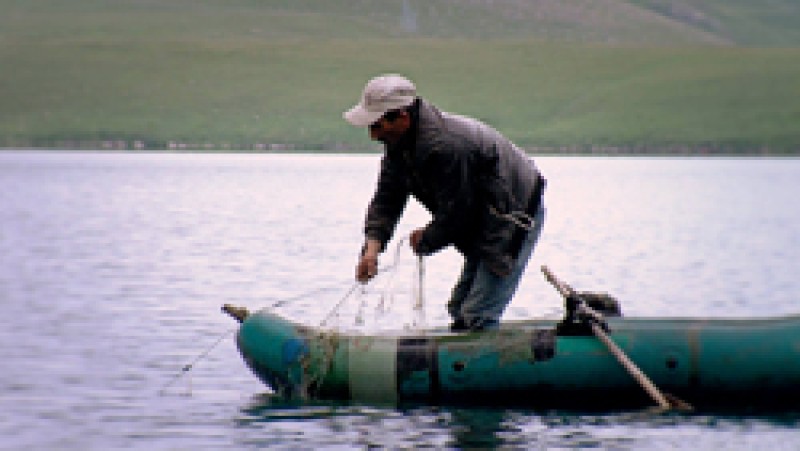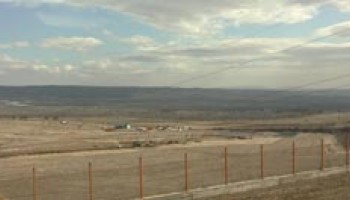In the fall of 2010, the villagers learned that they could no longer fish in the lake because the fishing license had been auctioned that September by the Ministry of Economy. The villagers knew nothing about this auction and say they would have bought the license themselves had they known about it.
An investigation by Studio Monitori, the Organized Crime and Corruption Reporting Project’s (OCCRP) partner in Georgia, has revealed that Tbebi LLC was the only company that participated in the auction. It paid only US$995 for the right to fish exclusively for 20 years.
Tbebi LLC was registered as a company in Georgia just four days before the auction. The documents say the owner of Tbebi is Vardan Ayvazyan, a Tabatskuri native who moved to Armenia as a child and became one of its most powerful politicians.
Ayvazyan is a well-known and colorful political character. Now a member of the Armenian Parliament, from 2001-2007 he served as that country’s Minister of Environmental Protection. A dispute with a gold company during his tenure led to Ayvazyan being fined US$37 million in a New York state lawsuit.
A full year after founding Tbebi and obtaining the fishing license, Ayvazyan told an Armenian reporter in October 2011 that he had no businesses in Georgia. But in February 2012, Ayvazyan visited Georgia, and after that began establishing a fish farming business.
Ayvazyan visited the lakeside village where he grew up, and made it clear that he had Georgian government support for his venture.
“Vardan Ayvazyan, Vano Merabishvili (the powerful former Interior Minister) and our police chief Mamuka Khvedeliani were friends. I saw them dining at the local hotel,” said villager Lavrenti Muradiani.
Other villagers agree in a Studio Monitori video report broadcast on Maestro TV. “They dined here with Merabishvili,” a group tells the camera. “So he gave the lake to him as a present. That’s what he (Ayvazyan) told us: ‘He gave it to me. No one can stand in my way. I have people supporting me."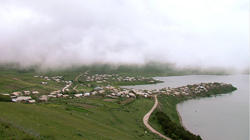 Residents of Tabatskuri village say that since fishing rights on the lake were sold, they have lost their traditional livelihood. Photo by Nana.
Residents of Tabatskuri village say that since fishing rights on the lake were sold, they have lost their traditional livelihood. Photo by Nana.
Ayvazyan readily admits a personal relationship with Merabishvili. “I know him, and I am really happy about it. I never betray friends, and I never interfere in Georgia’s internal politics. We accepted a commercial offer only. We discussed this issue with him. He had no personal interest in this business.”
Merabishvili is in jail facing charges related to his time in office. He is currently on trial for abuse of power for his role in a violent police crackdown on anti-government demonstrations on May 26, 2011; he faces other charges of misusing public funds during the 2012 presidential campaign. Through his lawyer, Studio Monitori sent questions to Merabishvili, who said he will have no comment at this time.
According to the license that Tbebi LLC received from the Minister of Economy, the company was prohibited from stocking any species of fish in the lake without the approval of the Ministry of Environment. But the company shipped huge quantities of crawfish from Lake Sevan in Armenia and dumped them into Tabatskuri Lake.
“We noticed trailer trucks, two or three of them, at the shore of the lake. There were also three or four minibuses loaded with crawfish,” said fisherman Vardan Muradian.
“I saw a carton filled with crawfish dumped from a truck. Many of them were dead and waves carried them to the shore. All the people were gathering them, and probably in all the houses crawfish were being boiled that day,” says local schoolteacher Nino Sandadze.
According to the villagers, after the crawfish were put in the lake, the number of fish declined. Dr. Bella Japoshvili, who specializes in studies of fish life for the Institute of Zoology at Ilia State University, says these crawfish mainly eat water plants. “But (the crawfish) also like to eat fish spawn,” she said. “If the locals say the number of fish is declining, that might be one of the factors.”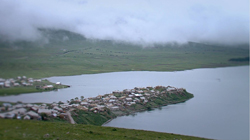 Many of the fishermen in Tabatskuri Village live on a peninsula that juts out into the lake, which made it easy for them to launch their boats before they lost the right to fish. Photo by Nana.
Many of the fishermen in Tabatskuri Village live on a peninsula that juts out into the lake, which made it easy for them to launch their boats before they lost the right to fish. Photo by Nana.
Maia Chkhobadze, head of a biodiversity control agency in the Ministry of Environment, said Tbebi LLC was fined for stocking the crawfish, but couldn’t produce a document showing the amount of the fine.
“Before stocking the (crawfish), Vardan Ayvazyan said it would benefit us, too. He turned out to be a thug. We didn’t know that,” said fisherman Lavrenti Muradiani.
Ayvazyan disagrees. “There were no fish in (the lake in) the first place. They appeared later. Our company does not catch and sell fish. Our company invested money, drew up a plan, stocked fish spawn and crawfish in the lake, and started to build cottages. Those villagers are common poachers and nothing else.”
According to the license, Tbebi LLC was obligated “to provide the Environmental Protection Inspection Agency with information on types and quantity of fish caught no later than the fifth day of each month throughout the fishing season.” Studio Monitori could find no evidence that Tbebi LLC provided that information in 2012-13.
Tbebi LLC was also obligated to submit to the Ministry of Economy an annual request to determine the amount of fish that could be caught in the lake. Tbebi LLC did not submit a request for two consecutive years and was fined US$1,190 for this omission.
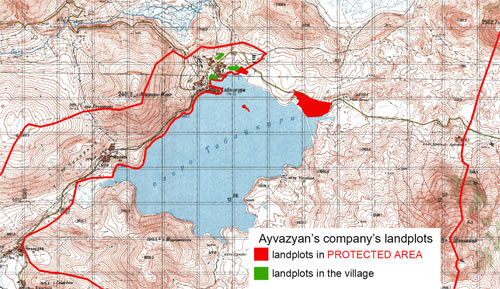 Most land surrounding Tabatskuri Lake is protected; the red plots within the protected zone are to be developed.
Most land surrounding Tabatskuri Lake is protected; the red plots within the protected zone are to be developed.
Tbebi LLC also agreed “to submit to the Ministry of Environment a five-year management plan within a year after receiving the license.” The management plan describes how a licensee plans to carry out its activities. Tbebi LLC has yet to have a plan approved.
“Numerous monetary sanctions have been enforced upon the licensee since the day of the issuance of the license,” said Chkhobadze. “The company failed to submit a management plan in a timely manner. The submitted plan lacked important details. The situation was not described clearly. Therefore, the plan was referred back to the licensee to correct and reconsider.”
The license signed in 2010 mandated the stocking of fish. “Ten thousand spawn were placed in the lake, including trout. I even verified the size,” Ayvazyan said. But according to a Department of Environmental Supervision letter from 2013:
“No fish have been placed in the lake since the day of licensing.”
Tabatskuri residents, some of whom have continued to fish in the lake illegally, said they have been warned repeatedly not to do so by Tbebi. “He (Vardan Ayvazyan) said: ‘Make my day. Go fishing if you have the guts. I’ll have you jailed,’ ” recalls fisherman Muradian.
Villagers claim a security guard hired by the company to prevent them from sneaking onto the lake to fish started to slash their rubber boats.
“This is my boat,” said fisherman Armen Sandadze, pointing to a slice in the rubber. “I traded it for a bull. It’s worth US$475. They, the owner’s people, went right inside my house and sliced it. I cannot go far out in the lake. It’s not safe.”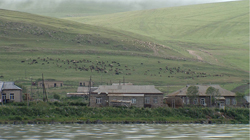 Tabatskuri Lake and village lie above the treeline, so villagers must burn dried dung to keep warm during winters when the snow is three to four meters deep. Photo by Nana.
Tabatskuri Lake and village lie above the treeline, so villagers must burn dried dung to keep warm during winters when the snow is three to four meters deep. Photo by Nana.
Surviving near the lake, which is more than 2000 meters above sea level and above the tree line, was difficult before the lease deal. Winter starts in early October and lasts until May. With no gas pipes or any wood nearby to cut, villagers heat their homes by burning dried animal manure. Villagers grow potatoes and raise livestock, but fishing is vital to the residents.
According to Tabatskuri residents, after fishing became restricted, local men started to migrate abroad. Zhana Avakyan’s husband left his family of eight and moved to Moscow to support them.
“Eighty percent of the local youth have moved to Russia from our village because they are prohibited from being near the lake,” said the 31-year-old Avakyan. “They used to work there, fishing and making like six dollars a day, which was not bad at all. Now everyone is in need, so people fled to Russia.”
One year after the Tabatskuri Lake fishing license was sold to Tbebi LLC, the company benefited again, receiving valuable land for virtually nothing. On June 21, 2011, then-Georgian president Mikheil Saakashvili issued a decree granting Ayvazyan’s company 308,214 square meters adjacent to the lake for 60 cents.
According to a map provided by the Agency for Protected Territories, portions of this land were located in protected territories.
“Sale of protected territories as property violates the Law on the System of Protected Territories of Georgia,” said Sulkhan Saladze, an attorney for the Georgia Young Lawyers Association. “This law states unequivocally that only the state can be in possession of protected territories. The president’s actions were obviously unlawful.”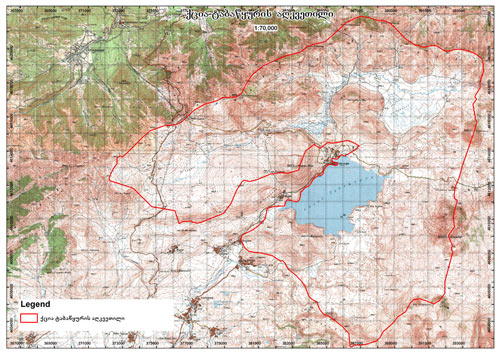 The Qtsia-Tabatskuri protected area surrounds the lake; only the villages and road connecting them lies outside it.
The Qtsia-Tabatskuri protected area surrounds the lake; only the villages and road connecting them lies outside it.
The Agency for Protected Territories said it was unaware of this violation until OCCRP brought it to their attention. “In light of this document and evidence provided by you, I confirm that this is indeed a protected territory. It does not matter if it was sold by the authority of the President. Of course it is a violation, and we will file a complaint in court. In addition, we will ask the Ministry of Economy to start the process of terminating the agreement,” said Rati Japaridze, the chairman of the Agency for Protected Territories.
When asked if he knew the land plots his company bought were located on protected territory, Ayvazyan replied: “I can return the land tomorrow. If I were to receive a note from the ministry tomorrow… Glory to the state! Glory to the government! We will return it tomorrow… ”
On June 30, 2011 a bill of sale regarding the purchase of land was executed between the Ministry of Economy and Tbebi LLC. The document states: “Tourist infrastructure and a fish farm shall be established on the territory by June 1, 2014. At least US$217,344 shall be invested.”
The deadline for Tbebi LLC to fulfill its contractual obligations is June 1, 2014. But Tabatskuri is still covered by deep snow, and the roads will be blocked until early May. So it’s highly unlikely any tourist infrastructure or fish farm will be built before the deadline.
The Ministry of Economy refused to comment when asked if it had ever inspected Tbebi LLC’s project to see if the company was complying with the contract.
In July of 2012, Armen Ayvazyan, Vardan Ayvazyan’s nephew, was appointed director of Tbebi LLC. In October 2012, full ownership of the company was registered under his name.
For now, the villagers can only wait and see what government action -- if any -- will be taken after the June 1 deadline passes.
